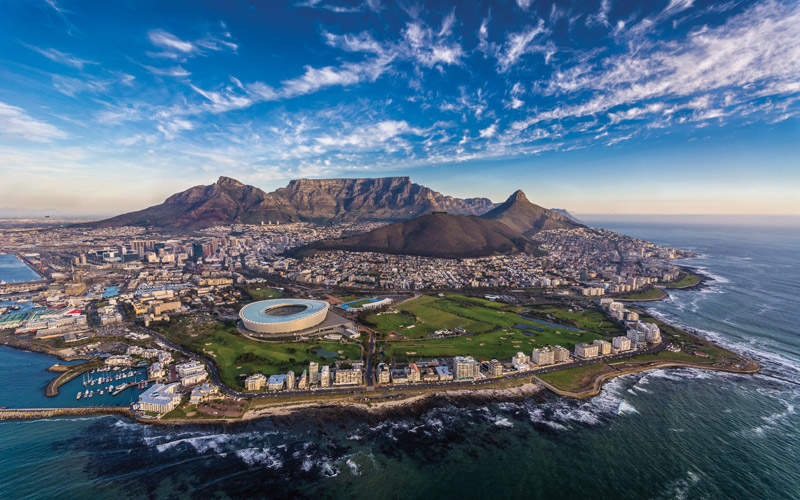Voted coolest street in the world, here’s why
Train travel in Cape Town
Moving to the suburbs doesn’t have to be a move away from reality, not if you decide to commute by train
I was catching up with a friend over sushi this week, the subject was travel. Inner city travel, that is. I was surprised that he was surprised that I take the train a lot now. I live in the suburbs, I work in the city, and I hate traffic. It’s a no-brainer, isn’t it? Apparently not.
“Is it safe?” he asked with a curious frown. It’s safer than taking a minibus taxi, I answered, no drivers on Tik there.
“But what’s it like?” he asked further. It’s worth a few words here, perhaps most importantly because this form of transport is largely misunderstood and somewhat stigmatised.
It’s like flying, really. Trains are smooth runners, compared to stop-start traffic or the lurch and surge of minibus taxis. It’s possible to stand without holding onto anything, and sometimes you’re even lucky enough to find a carriage with clear windows (but only sometimes). The worst you get is a being stuck in a stuffy, sticky carriage at rush hour. I have more than once had a considerate soul remind me to close my handbag. People are surprisingly quiet, though I wonder if it’s because almost everyone is half asleep first thing in the morning.
Trains – really cheap and mostly safe
Trains are definitely cost effective. A 3rd class monthly pass from the city as far as Retreat is R99. If you’re going back and forth weekdays, that works out to between R1,98 and R2,48 one way (depending on how many working weeks there are in any given month).
I travel at rush hour, with people doing much the same thing as I am– moving between one point and another for one reason or another. It feels pretty safe – I happily carry cameras and laptops (hidden, of course) on both classes. I actually can’t quite tell the difference between the classes, to be honest.
It seems first class has nicer seats and that 3rd class is a lot more racially mixed, which feels more real. As far as being in close quarters with total strangers, I haven’t come across anything less savoury than someone’s stinky breath, and as far as safety in public goes, I always watch body language carefully to see if I’m being watched. As a South African woman, this is second nature, no? There’s visible security at every major station on the Southern Suburbs line. I don’t have to travel at night, and if I were to travel outside of busy hours during the day, I’d do it on a major line, and make sure I got on a carriage with other people already in it.
The issue of train speed and efficiency
I’ve ridden the beast that is London’s network of underground snakes; I’ve found my way around Delhi, Istanbul and Tel Aviv in everything from a manpowered riksha to a topless truck. By first world standards, the mechanics of Cape Town Metro could certainly do with a major upgrade, or perhaps even a total overhaul. By old world standards, it’ll do. The common wisdom that one should calculate an extra half hour into every single trip is both wise and inconvenient. Who really has the time to do that? Not me, but it seems that every element of the system is dependent on every other element, and problems quickly compound, so delays are not going to disappear any time soon.
If one train starts lagging at rush hour, and picks up a delay of fifteen seconds at every stop because too many people are boarding it, so too do all the trains behind it. This means trains get cancelled or delayed for up to forty five minutes at a time. But that’s not all the time, and one quickly learns to find out the status quo from commuters. It seems the platform employees, while friendly, are rarely privy to any useful information (and don’t bother asking for a timetable, they haven’t had any for years). It’s best to just ask a driver.
The people – real, ordinary (and righteous)
In the course of a few weeks, I’ve come across some sweet souls; some vicariously (like the dapper Francophone chatting up two pretty sisters), others directly (a construction worker who swapped thoughts on the Palestine/Israel conflict with me). One time an evangelist screamed “you should do it for JEEEEZuSS” in my general direction and I wondered if that would help the train arrive on time. The compassion that the working class shows blind buskers playing plonk-y keyboard badly is humbling (incidentally, the good buskers make three times as much three times as fast, proving that we have taste no matter where we are in this musical city). I daresay buskers make more money than the informal traders punting safety pins, instant glue, chips, drinks and “Fry-toes”.
Advice: if you’re going to be travelling the same route(s) regularly, buy a month pass once you’ve decided which class you’re most comfortable in.
Convenient? For certain stretches, yes. For long hauls? Perhaps out of the city, but I wouldn’t like to travel from Simons Town to Cape Town at rush hour.
Will I commute in winter? Possibly, with gumboots. The prospect of being stuck in humid carriage with other damp souls and dripping umbrellas and raincoats is not particularly pretty, true, but it beats bumper-to-bumper traffic. Besides, you can read on the train.
I wouldn’t recommend: you arm yourself with anything like a knife unless you’re an expert at disarming. Someone may take it off you and use it against you. Arm yourself with good company and a conscious attitude instead.
I’ve even had a mind altering experience through the unifying effect of music. Read more about how that short train journey changed my life.
By Jess Henson
---
This is how the coronavirus is affecting travel and transport in Cape Town.
For a party that peaks from start to finish and starts and ends on a train, get on board the Make Believe Train Party.
---
For your monthly update on what’s happening in and around Cape Town, be sure to subscribe to our popular Editor's Picks Newsletter.








